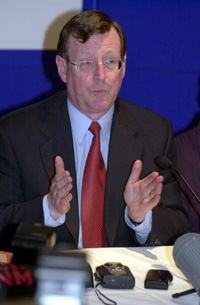11 March 2004 Edition
Unionist Crisis? Blame Republicans!
BY LAURA FRIEL

David Trimble
The Ulster Unionist Party plunged further into chaos this week with yet another divisive challenge to David Trimble's leadership. The challenge emerged following the submission of a letter, signed by three Ulster Unionists 'unhappy' with Trimble's leadership of the party, which called for a no confidence debate at the forthcoming UUP Annual General Meeting. The AGM is due to be held on 27 March and party rules require the leader to seek re-election annually.
At a private meeting of UUP Assembly members, Trimble and his supporters attempted to thwart the call for a no confidence debate by calling on the party's MLAs to vote on whether to have a vote of no confidence. Trimble carried the motion against his detractors but with only a single vote and in the absence of one MLA.
Twelve Assembly members voted in favour of Trimble and eleven against but crucially, John Taylor was absent from the meeting. Unionist commentators agree that if Taylor had been present, the vote would have been deadlocked. They also agree that Trimble is now in serious trouble and some have even suggested that rather the face the humiliation of defeat, Trimble will stand down before the AGM.
However, despite the tight vote, Trimble emerged from the meeting typically bullish, declaring his intention to win any leadership contest should it emerge. "We had a good meeting and a good discussion," said Trimble, "I am entirely happy with the conduct and outcome of the meeting."
But if Trimble's initial comments were designed to convey a sense of party unity and resolution, it was immediately belied as he went on to complain that a collective decision "not to comment on the detail of the meeting" had been broken by his party colleagues.
Within hours, one of the authors of the letter calling for a vote of no confidence, David Burnside, confirmed that a leadership challenge would be mounted at the AGM "if David Trimble does not agree to stand down in the interests of the party".
Meanwhile, the DUP were pursuing their anti-Agreement agenda with continued calls to the British Prime Minister to "get tough with Sinn Féin". DUP leader Ian Paisley emerged from a Downing Street meeting with Tony Blair demanding that 'privileges' arising out of their electoral mandate should be withdrawn from Sinn Féin.
Over 30 years ago, Ian Paisley began his political career by campaigning against northern nationalists securing an equal right to vote. Having failed in this endeavour, Paisley now hopes to render northern nationalists' right to vote null and void by disqualifying their elected representatives from actually representing their electorate.
Of course, the DUP's agenda of denying the majority of northern nationalists political representation has recently been greatly assisted by allegations by the PSNI Chief Constable Hugh Orde and the actions of his officers. This week, PSNI officers were engaging in a charade of 'warning' of a 'threat' of imminent 'punishment beatings' by republicans in Belfast.
Orde may have made the bullets, but his political masters were quick to fire them, with both governments attempting to redefine the current political crisis.
In this topsy-turvy world, pro-Agreement republicans rather than anti-Agreement unionists are identified as the 'threat' to the current peace process and the source of the 'crisis' in the institutions. In other words, we are being asked to believe that Sinn Féin's willingness to share power with unionists rather than the unwillingness to share power with nationalists in any meaningful way by the DUP (and elements within the UUP) is the real source of the political 'crisis'.
Now the DUP and UUP would like to see a return to the old unionist controlled Stormont by recreated a politically marginalised nationalist 'minority'. Demographic changes, which have rendered the notion of a 'majority' community in the north a nonsense, and the continuing refusal of the 'croppies' to lie down, despite 30 years of repression, are difficulties the DUP hope to overcome with the help of the IMC and SDLP.
Ian Paisley has called on the SDLP to "do business with the DUP" by dropping its insistence of inclusion of all the major parties.
Unionist paramilitaries have killed seven people, targeted another 28 and shot a further 107 within the last year. The silence of unionist politicians in relation to unionist violence, the majority of which is racist and sectarian, stands in sharp contrast to their clamour for an immediate 'investigation' by the IMC into allegations of republican involvement in an incident that was little more than a pub brawl.
But we really shouldn't be surprised at this bizarre turn of events, a crisis in unionism has traditionally been laid at the door of republicans.



